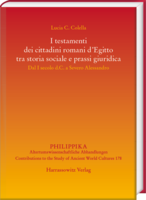|
weitere Titel zum Thema:
Lucia Consuelo Colella offers both a critical edition and a historical and juridical analysis of the documentation for Roman testamentary practice in Egypt prior to the constitution of Alexander Severus, which authorized the use of the Greek language in drafting Roman wills. Before this measure, the Roman citizens in Egypt, most of whom spoke Greek, used drafts and translations in Greek, as can be seen from the surviving documents. The material analyzed here includes Roman wills which have survived on wax tablets or papyrus both in Latin and Greek. There are 26 wills, one of which is identified for the first time and two unpublished documents on testamentary dispositions.
The critical edition of these documents also takes into account paratextual and linguistic aspects, for the first time in some cases. The new information that emerges forms the basis for an analysis of the socio-economic profile and the language skills of the testators, beneficiaries and witnesses in relation to the groups of Roman citizens in Egypt for whom we have information from other sources, as well as reflections on the representativity of the papyrological sources with regard to the proportion of soldiers and veterans among Roman citizens in the province prior to the Constitutio Antoniniana. In the light of new textual information, it is also possible to address the relationship between Roman law and local practice in the period before the constitution of Alexander Severus, also in terms of the extension of the privilege of the so-called testamentum militis. |






